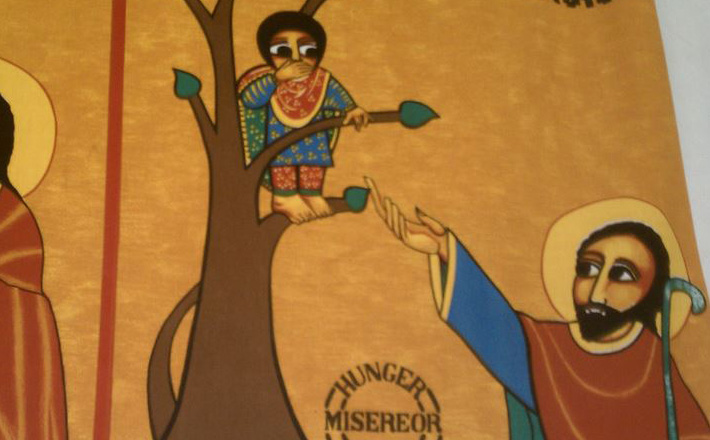Commentary on Habakkuk 1:1-4, 2:1-4
“I resolved to expound this prophet Habakkuk so that he, too, may finally come to light and that his contents may be learned…”
So wrote Martin Luther in his preface to the book of Habakkuk in 15261, and it would be a grand thing if preachers followed Luther’s example and preached this minor prophet this week. The selected readings from Habakkuk 1 and 2 for this week contain not only the first biblical sounding of the central theological declaration of the Reformation, “the righteous live by their faith,” (2:4; see also Romans 1:17; Galatians 3:11), but is an important sense these two pieces from Habakkuk form a sort of bracket between which the believer (and the unbeliever alike) live in this world.
Habakkuk 1:1-4 contains, as the heading in the New Revised Standard Version has it, “The Prophet’s Complaint.” In classical complaint language, the prophet asks God “How long?” (1:2), and “Why?” (1:3). Habakkuk is begging for God to listen, to save; to do something about the destruction and violence that he constantly sees. The crux of the prophet’s complaint comes in 1:4:
So the law becomes slack
and justice never prevails.
The wicked surround the righteous —
therefore judgment comes forth perverted.
Two critical things are addressed here, one that is obscured a bit in translation, while the other may slip by unnoticed. First, the translation issue. I want to offer a more simplistic translation of this verse, in which we stick to using the same English word when translating out of the Hebrew; as a philosophy of translation this makes, sometimes, for awkward English, but in this case may be necessary to see the interconnectedness of the two parts of this one verse. In Hebrew two words are used twice, in 1:4a and 1:4b, mishpat and yatsa. In the NRSV, these two words are translated differently each time. This translation is not wrong; in fact it is quite good. The problem is that the interplay between the cola of the poem is obscured. Thus,
So the law becomes slack
and judgment (mishpat) never comes forth (yatsa).
The wicked surround the righteous —
therefore judgment (mishpat) comes forth (yatsa) perverted.
Mishpat really means something more like “judgment,” than it does “justice,” although it should not be assumed that justice and judgment are not intimately connected — one would hope and pray.
Whichever way one would choose to go (judgment or justice) the key is that it is the same word used. Habakkuk laments first that judgment/justice does not come about, and then in classical Hebrew parallelism that judgment/justice does come forth, but it is perverted and twisted, a mockery of justice.
The second critical piece of this verse, then, has to do with how judgment/justice goes forth. Notice that the Law, the Torah, has been misappropriated by the wicked. That “judgment” or “justice” is not merely prevented, it is perverted. Habakkuk’s complaint is that when God does not listen, when God does not save us from our times of trial, it is not simply the lack of the Law that hurts, but that in God’s apparent absence the Law is twisted, applied with perverted force: perhaps brutally, perhaps relentlessly, perhaps gracelessly, perhaps only to others. This is the problem, and a present reality not only for Habakkuk but in any time and place — perhaps our times and places, as well.
Having made his complaint, the prophet then declares that he will stand watch and wait, to see how God “will answer concerning my complaint.” And then, perhaps shockingly, Habakkuk 2:2 says, “Then the Lord answered me….” Habakkuk may have been as shocked as Job when God answered, he may have wondered if it was wise to press so searchingly, so seriously for God’s response. But God answers.
(There is, perhaps, a sermon in just those words, “Then God answered me….” What would that be like, look like, feel like, mean?)
The Lord tells Habakkuk to do something that, if we think about it, may seem strange: “Write the vision; make it plain on tablets, so that a runner may read it.” This may mean that the runner is intended to run around holding the tablets, calling out the vision as she runs. Try reading while running; presumably the writing would have to be pretty large to be readable with all of the jarring ups and downs of even a brisk jog. Or, perhaps, this may mean that Habakkuk is to take out a billboard-like ad and write the vision large enough that anyone passing by may see and read it. Regardless, this is not the usual prophetic message to be spoken in the temple courtyard, or on a street corner, or on the palace steps. This is something different.
God goes on in Habakkuk 2:3 to make a critical promise to the prophet, and the prophet’s people, waiting to hear God’s answer: There is still a vision for the appointed time. The key words here (one word in Hebrew, moed) are “appointed time.” This word in Hebrew is used to designate festival times in Israel’s worship (Leviticus 23:2), a time of birth (Genesis 17:21; 18:14; 21:2), seasonal migration (Jeremiah 8:7), and, yes, the end time (Daniel 8:19). “Appointed time” here means the right time, God’s time, the time in which God’s promise — the vision that still is not only readable for the runner, but in force for God’s people — God’s Word will come to pass. The people are called told to wait for it, and in the meantime to be faithful.
And this is the life of faith, is it not? To live in the between of complaint and struggle on the one hand, and God’s right time on the other. This is where we live as people of faith, active and alive in this world, struggling with injustice against perverted judgments and the slackening of God’s Law, and waiting for God’s promised time, for the promise that God makes, that God has answered us, and will again; that God has saved us through Christ Jesus, and so we are saved. As the prophet closes his book in prayer,
Though the fig tree does not blossom,
and no fruit is on the vines…
yet I will rejoice in the Lord;
I will exult in the God of my salvation.
God, the Lord, is my strength;
he makes my feet like the feet of a deer,
and makes me tread upon the heights (Habakkuk 3:17a, 18-19).
1 Luther’s Works, 19.150.


November 3, 2013